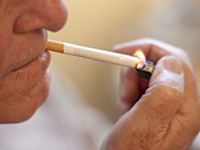
TUESDAY, June 21, 2011 (Health.com) — Men with prostate cancer who are cigarette smokers at the time of their diagnosis are much more likely to die of the disease or experience a recurrence than nonsmokers, including former smokers who kicked the habit at least 10 years before diagnosis.
That’s the conclusion of a new government-funded study published this week in the Journal of the American Medical Association, and it’s one more very good reason to quit smoking.
The study followed 5,366 men—all diagnosed with prostate cancer between 1986 and 2006—for about eight years, on average. Nearly 10% of the men ultimately died from the disease, and 16% experienced a recurrence following treatment.
Compared to men who had never smoked, those who were actively smoking when they were diagnosed were 61% more likely to die and 61% more likely to experience a recurrence.
If you smoke, says lead researcher Stacey A. Kenfield, ScD, an epidemiologist at the Harvard School of Public Health, in Boston, “you will have a more aggressive cancer.”
Smokers are generally less healthy than nonsmokers, and because they tend to receive less prostate-cancer screening, their likelihood of being diagnosed with advanced-stage cancer may be higher. Even when the researchers took the severity of the cancer into account, however, smokers were still 38% more likely to die and 47% more likely to have a recurrence than nonsmokers.
“[These] data suggest that smokers develop cancers that are more likely to kill them,” says Joshi Alumkal, MD, a prostate cancer specialist at Oregon Health and Science University, in Portland, who was not involved in the study. “Smoking is a key factor that determines how aggressive prostate cancer will be.”
Smoking might directly affect the aggressiveness of cancer, Kenfield and her colleagues say. Carcinogens in tobacco smoke may speed tumor growth, for instance, as might the higher levels of testosterone associated with smoking.
In the study, heavier smokers and those who smoked for longer periods of time fared the worst. Men who’d smoked a pack a day for 40 years—or, equivalently, two packs a day for 20 years—were 82% more likely to succumb to prostate cancer than men who had never smoked.
There is some good news for men who have quit smoking. Those who quit 10 years prior to being diagnosed with prostate cancer were no more likely to die of the disease than men who had never smoked at all. And even men who quit less than a decade before diagnosis had similar survival rates to nonsmokers, provided they were not heavy smokers to begin with.
Urging patients to quit as early as possible is crucial, says Alumkal, who points out that even men in their 30s may be harboring cancerous tumors in their prostates. “Early on we may have cancers within us,” he says. “Smoking could aggravate and accelerate their growth.”
Roughly 1 in 6 men will be diagnosed with prostate cancer during his lifetime. It’s the most common form of cancer among American men, and, after lung cancer, the second-most lethal. The American Cancer Society estimates that 32,000 men died of the disease in 2010.
Though common, prostate cancer is not always aggressive. In some cases, it may not require immediate treatment.





